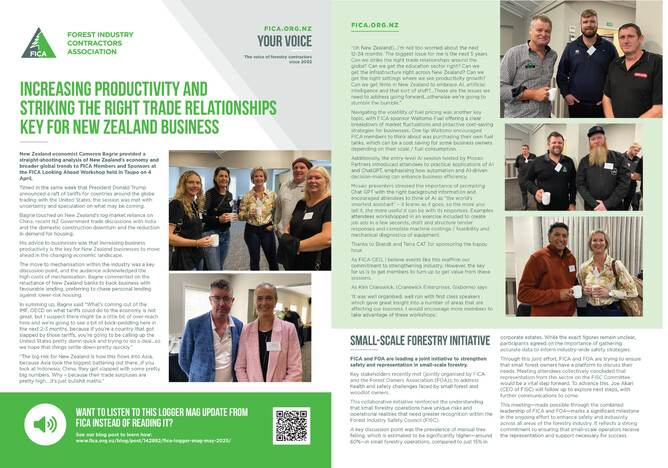Want to listen to our FICA Logger Mag updates instead of reading them? Here's how:
1. Update your settings (phones / tablets) or install this free audio reader extension (desktop / laptop):
a. iPhone: To use the built-in text-to-speech feature on your iPhone, go to:
Settings > Accessibility > Spoken Content and enable "Speak Selection" or "Speak Screen" to have the iPhone read selected text or the entire screen aloud, respectively.
b. Samsung: To activate and customize the text-to-speech "Read Aloud" feature on your Samsung Galaxy phone or tablet, navigate to Settings > Accessibility > Text-to-speech output, where you can choose your preferred engine, language, speech rate, and pitch.
c. Computer: Install Read Aloud: A Text to Speech Voice Reader. Then the orange megaphone icon should appear in the top right of your web browser - you can use the controls to play / stop / skip as needed.
2. The FICA page content will appear below when Logger Mag comes out on the shelves. If on your iPhone, select / highlight the text and click 'speak' to listen. If you're on your computer, press the orange megaphone icon (normally in the top right of your web browser).
Increasing productivity and striking the right trade relationships key for New Zealand business
New Zealand economist Cameron Bagrie provided a straight-shooting analysis of New Zealand’s economy and broader global trends to FICA Members and Sponsors at the FICA Looking Ahead Workshop held in Taupo on 4 April.
Timed in the same week that President Donald Trump announced a raft of tariffs for countries around the globe trading with the United States, the session was met with uncertainty and speculation on what may be coming.
Bagrie touched on New Zealand’s log market reliance on China, recent NZ Government trade discussions with India and the domestic construction downturn and the reduction in demand for housing.
His advice to businesses was that increasing business productivity is the key for New Zealand businesses to move ahead in the changing economic landscape.
The move to mechanisation within the industry was a key discussion point, and the audience acknowledged the high costs of mechanisation. Bagrie commented on the reluctance of New Zealand banks to back business with favourable lending, preferring to chase personal lending against lower-risk housing.
In summing up, Bagrie said “What’s coming out of the IMF, OECD on what tariffs could do to the economy is not great, but I suspect there might be a little bit of over-reach here and we’re going to see a bit of back-peddling here in the next 2-3 months, because if you’re a country that got slapped by those tariffs, you’re going to be calling up the United States pretty damn quick and trying to do a deal…so we hope that things settle down pretty quickly.”
“The big risk for New Zealand is how this flows into Asia, because Asia took the biggest battering out there…if you look at Indonesia, China, they got slapped with some pretty big numbers. Why – because their trade surpluses are pretty high….it’s just bullshit maths.”
“(In New Zealand)…I’m not too worried about the next 12-24 months. The biggest issue for me is the next 5 years. Can we strike the right trade relationships around the globe? Can we get the education sector right? Can we get the infrastructure right across New Zealand? Can we get the right settings where we see productivity growth? Can we get firms in New Zealand to embrace AI, artificial intelligence and that sort of stuff?...Those are the issues we need to address going forward…otherwise we’re going to stumble the bumble.”
Navigating the volatility of fuel pricing was another key topic, with FICA sponsor Waitomo Fuel offering a clear breakdown of market fluctuations and proactive cost-saving strategies for businesses. One tip Waitomo encouraged FICA members to think about was purchasing their own fuel tanks, which can be a cost saving for some business owners depending on their scale / fuel consumption.
Additionally, the entry-level AI session hosted by Mosaic Partners introduced attendees to practical applications of AI and ChatGPT, emphasising how automation and AI-driven decision-making can enhance business efficiency.
Mosaic presenters stressed the importance of prompting Chat GPT with the right background information and encouraged attendees to think of AI as “the world’s smartest assistant” – it learns as it goes, so the more you tell it, the more useful it can be with its responses. Examples attendees workshopped in an exercise included to create job ads in a few seconds, draft and structure tender responses and complete machine costings / feasibility and mechanical diagnostics of equipment.
Thanks to Brandt and Terra CAT for sponsoring the happy hour.
As FICA CEO, I believe events like this reaffirm our commitment to strengthening industry. However, the key for us is to get members to turn up to get value from these sessions.
As Kim Cranswick, (Cranswick Enterprises, Gisborne) says
‘It was well organised, well run with first class speakers which gave great insight into a number of areas that are affecting our business. I would encourage more members to take advantage of these workshops.’
Small-scale Forestry Initiative
FICA and FOA are leading a joint initiative to strengthen safety and representation in small-scale forestry.
Key stakeholders recently met (jointly organised by FICA and the Forest Owners Association (FOA)), to address health and safety challenges faced by small forest and woodlot owners.
This collaborative initiative reinforced the understanding that small forestry operations have unique risks and operational realities that need greater recognition within the Forest Industry Safety Council (FISC).
A key discussion point was the prevalence of manual tree felling, which is estimated to be significantly higher—around 60%—in small forestry operations, compared to just 15% in Small-Scale Forestry Initiative corporate estates. While the exact figures remain unclear, participants agreed on the importance of gathering accurate data to inform industry-wide safety strategies.
Through this joint effort, FICA and FOA are trying to ensure that small forest owners have a platform to discuss their needs. Meeting attendees collectively concluded that representation from this sector on the FISC Committee would be a vital step forward. To advance this, Joe Akari (CEO of FISC) will follow up to explore next steps, with further communications to come.
This meeting—made possible through the combined leadership of FICA and FOA—marks a significant milestone in the ongoing effort to enhance safety and inclusivity across all areas of the forestry industry. It reflects a strong commitment to ensuring that small-scale operators receive the representation and support necessary for success.
Informe – Your Go-To Guide for Forestry Costs
Informe is an annual publication by Forme Forest Consultants that helps forestry professionals keep track of how much it really costs to run a forestry crew. With rising fuel prices, labour costs and operating costs, Informe gives you the tools to price your work and stay profitable. FICA members are eligible for a discount when purchasing the reports.
Now Available as a Web App
The Harvesting report is now offered in a new, easy-to-use web application. It’s designed to give you quick access to cost data from your computer — wherever you’re working.
Use your own variables within the model, including annual workdays, work hours, fuel pricing, and labour rates to generate a more specific crew daily cost.




